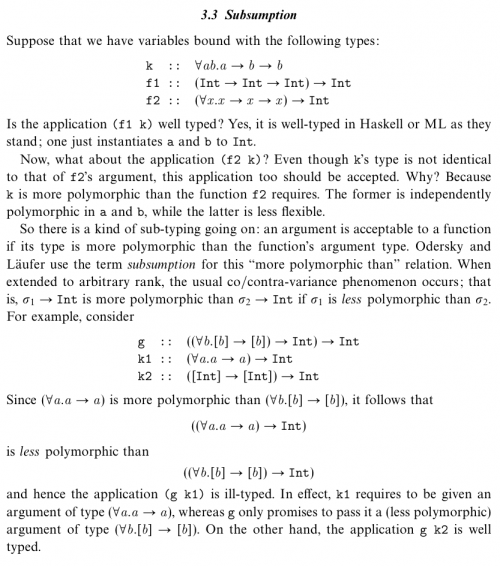Subsunción en tipos polimórficos
En 'Practical type inference for arbitrary-rank types' , los autores hablan de subsunción :

Trato de probar las cosas en GHCi mientras leo, pero aunque g k2 está destinado a revisar, no lo hace cuando intento con GHC 7.8.3:
λ> :set -XRankNTypes
λ> let g :: ((forall b. [b] -> [b]) -> Int) -> Int; g = undefined
λ> let k1 :: (forall a. a -> a) -> Int; k1 = undefined
λ> let k2 :: ([Int] -> [Int]) -> Int; k2 = undefined
λ> :t g k1
<interactive>:1:3: Warning:
Couldn't match type ‘a’ with ‘[a]’
‘a’ is a rigid type variable bound by
the type forall a1. a1 -> a1 at <interactive>:1:3
Expected type: (forall b. [b] -> [b]) -> Int
Actual type: (forall a. a -> a) -> Int
In the first argument of ‘g’, namely ‘k1’
In the expression: g k1
g k1 :: Int
λ> :t g k2
<interactive>:1:3: Warning:
Couldn't match type ‘[Int] -> [Int]’ with ‘forall b. [b] -> [b]’
Expected type: (forall b. [b] -> [b]) -> Int
Actual type: ([Int] -> [Int]) -> Int
In the first argument of ‘g’, namely ‘k2’
In the expression: g k2
g k2 :: Int
Realmente no he llegado al punto en el que entiendo el papel, todavía, pero aún así, me preocupa que he malinterpretado algo. En caso de que este tipo de comprobación? ¿Están equivocados mis tipos de Haskell?
1 answers
El typechecker no sabe cuándo aplicar la regla de subsunción.
Se puede decir cuando con la siguiente función.
Prelude> let u :: ((f a -> f a) -> c) -> ((forall b. f b -> f b) -> c); u f n = f n
Esto dice, dada una función de una transformación para un tipo específico, podemos hacer una función de una transformación natural forall b. f b -> f b.
Luego podemos probarlo con éxito en el segundo ejemplo.
Prelude> :t g (u k2)
g (u k2) :: Int
El primer ejemplo ahora da un error más informativo también.
Prelude> :t g (u k1)
Couldn't match type `forall a. a -> a' with `[a0] -> [a0]'
Expected type: ([a0] -> [a0]) -> Int
Actual type: (forall a. a -> a) -> Int
In the first argument of `u', namely `k1'
In the first argument of `g', namely `(u k1)'
No se si podemos escribir un más versión general de u; necesitaríamos una noción a nivel de restricción de menos polimórfico para escribir algo como let s :: (a :<: b) => (a -> c) -> (b -> c); s f x = f x
Warning: date(): Invalid date.timezone value 'Europe/Kyiv', we selected the timezone 'UTC' for now. in /var/www/agent_stack/data/www/ajaxhispano.com/template/agent.layouts/content.php on line 61
2014-11-07 18:17:31